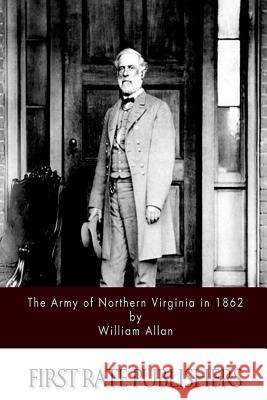The Army of Northern Virginia in 1862 » książka
The Army of Northern Virginia in 1862
ISBN-13: 9781494449575 / Angielski / Miękka / 2013 / 416 str.
With the exception of George Washington, perhaps the most famous general in American history is Robert E. Lee (January 19, 1807 - October 12, 1870), despite the fact he led the Confederate Army of Northern Virginia against the Union in the Civil War. Lee is remembered today for constantly defeating the Union's Army of the Potomac in the Eastern theater from 1862-1865, considerably frustrating Lincoln and his generals. His leadership of his army led to him being deified after the war by some of his former subordinates, especially Virginians, and he came to personify the Lost Cause's ideal Southern soldier. His reputation was secured in the decades after the war as a general who brilliantly led his men to amazing victories against all odds.
The last half of 1862 was among the most momentous times of the Civil War. The Second Battle of Bull Run (August 28-30, 1862) was one of the most decisive battles fought during the Civil War, and it was also one of the most unlikely. Less than three months before the battle, Joseph E. Johnston's Army of Northern Virginia had been pushed back nearly all the way to Richmond by George B. McClellan's Army of the Potomac, so close that Union soldiers could see the church steeples of the Confederate capital. And yet, at the end of Second Manassas, Robert E. Lee's Army of Northern Virginia found itself in the field unopposed about 20 miles away from the Union capital of Washington D.C.
The bloodiest day in American history took place on the 75th anniversary of the signing of the Constitution. On September 17, 1862, Robert E. Lee's Confederate Army of Northern Virginia fought George McClellan's Union Army of the Potomac outside Sharpsburg along Antietam Creek. That day, nearly 25,000 would become casualties, and Lee's army would barely survive fighting the much bigger Northern army. Although the battle was tactically a draw, it resulted in forcing Lee's army out of Maryland and back into Virginia, making it a strategic victory for the North and an opportune time for President Abraham Lincoln to issue the Emancipation Proclamation, freeing all slaves in the rebellious states.
With Washington urging Army of the Potomac commander Ambrose Burnside to advance against Lee, Burnside launched an ill fated operation near Fredericksburg in December 1862. From December 12-13, Burnside struggled to get his army across the river while it was under fire from Confederates in Fredericksburg, and things only got worse when they did. The battle is mostly remembered for the piecemeal attacks the Union army made on heavily fortified positions Longstreet's men took up on Marye's Heights. As they threw themselves at Longstreet's heavily fortified position along the high ground, the Northern soldiers were mowed down again and again. During the battle, Lee turned to Longstreet and commented, "It is well that war is so terrible, otherwise we should grow too fond of it."
Zawartość książki może nie spełniać oczekiwań – reklamacje nie obejmują treści, która mogła nie być redakcyjnie ani merytorycznie opracowana.











